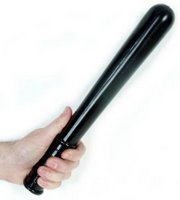 In the late 1990's the then mayor of New York Rudi Giuliani put a new phrase into the English language: zero tolerance. He used it to describe the non-discriminatory method of policing that took action against small things like street begging and graffitii. The belief was that putting a stop to petty crime would take away the environment in which more serious crime developed. It worked. And since then, the term has been applied to almost every aspect of law enforcement in every part of the globe.
In the late 1990's the then mayor of New York Rudi Giuliani put a new phrase into the English language: zero tolerance. He used it to describe the non-discriminatory method of policing that took action against small things like street begging and graffitii. The belief was that putting a stop to petty crime would take away the environment in which more serious crime developed. It worked. And since then, the term has been applied to almost every aspect of law enforcement in every part of the globe.In fact the idea predated Giuliani The architects were university professorss James Wilson and George Kelling who wrote this now famous quote nearly a quarter of a centaury ago "Consider a building with a few broken windows If the windows are not repaired, the tendency is for vandals to break a few more windows. Eventually, they may even break into the building, and if it's unoccupied, perhaps become squatters or light fires inside"
This week is London week of action on empty homes. I have just come back from a TV studio to talk about Zero tolerance towards empty homes. London borough of Newham is using the phrase to describe their latest push to compulsory purchase long-term empty homes. It's extraordinary to see the phrase come back to where it first began - empty property.
For what it's worth I think zero tolerance has its place in tackling empty homes, but only where everything else has failed. Owners of empty homes are not the same as petty criminal who vandalise them. Homes can become empty because the owner is unable to afford repairs, can't find anybody to sell it to or anybody to rent it to. These are things that the community and local authorities can help with. Only where that help has been spurned should we start to think about zero tolerance.

Why don’t we start with proper zero tolerance? Private property is private property and that is the basis of all further freedoms. So we have zero tolerance for those who would steal it? You know, like criminals and the like.
ReplyDeleteOr bureaucrats who would use the State.